How to Annotate a PDF on PC & Mobile
Mastering PDF annotation is essential for efficiently managing digital files. Tasks like adding notes or highlighting a PDF, aid in referencing, collaborating, studying, and organizing documents. They enhance presentations, streamline workflows, and improve communication within teams.
Most users who work with PDF documents may need to add notes or comments, overlay some text or a geometric object, etc. Such actions may be necessary for managers, and heads of departments when editing contracts, orders, invoices, or any other papers within the company. All these tasks can be completed with a PDF editor.
Overall, knowing how to mark up a PDF boosts efficiency, organization, and teamwork in both personal and professional settings.
This article will provide you with a detailed overview of 5 PDF annotators: for Windows, for macOS, and for iOS.
How to annotate a PDF on Windows
Icecream PDF Editor is a powerful PDF editing software for working with digital documents. Using PDF annotation is easy. Download PDF editor for Windows and install it on your computer. Upload the PDF document and switch to the "Annotate" mode.
You will see all the available in the menu on the left. Refer to the screenshot below.
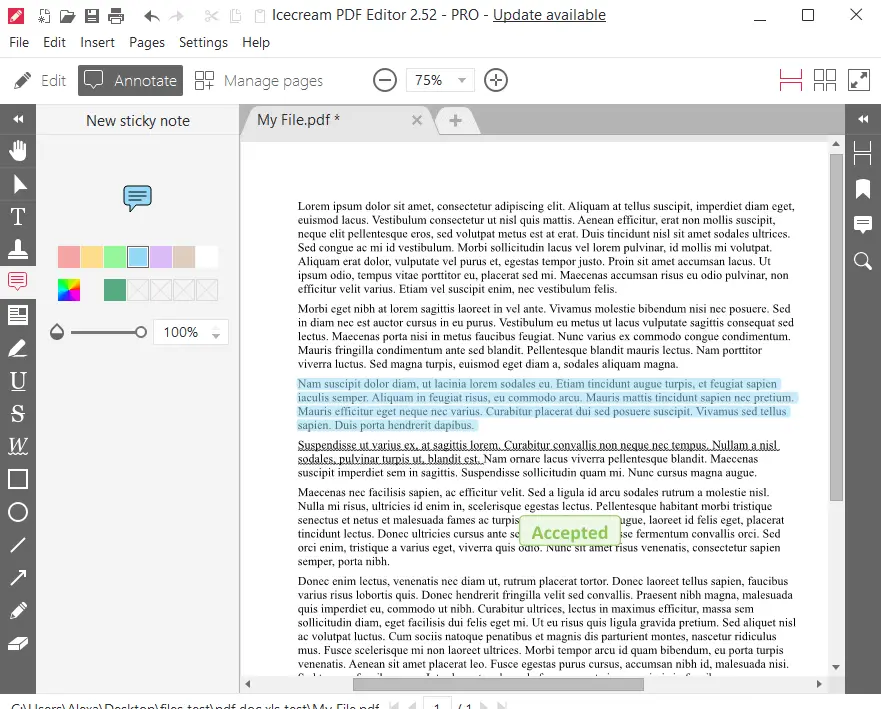
Now, let's take a closer look at each of the offered utilities of the free PDF editor.
1. Hand
Designed to quickly move within the document and find the necessary information. Select the tool and move the sheet in the desired direction by holding the left mouse button.
2. Select
Use this tool to pick out text or graphics for moving or resizing. Please note, that it works for objects added in the "Annotate PDF" mode only.
3. Text
This tool allows you to add a comment to PDF or write a new text in the white space. You can choose the font type and size, as well as the color and alignment (left, right, or justify).
4. Stamps
There are standard PDF stamps, such as "Accepted", "Disclaim", "Forbidden" and others. You can also make a custom design: enter your text, add the time stamps, or upload an image of a pre-made stamp.
5. Note
Add a note to PDF and pick a color you like. This functionality allows leaving notes for yourself, provide feedback to others, or work collaboratively.
6. Highlight Area
Highlight random and custom areas of the document. Choose the background color and adjust the transparency. Thus, you can bring the reader's attention to some important part of the document, for example, to an error.
7. Highlight Text
Highlight PDF text to indicate significant information in orders, instructions, and contracts. You have a choice of 7 standard and 5 custom colors.
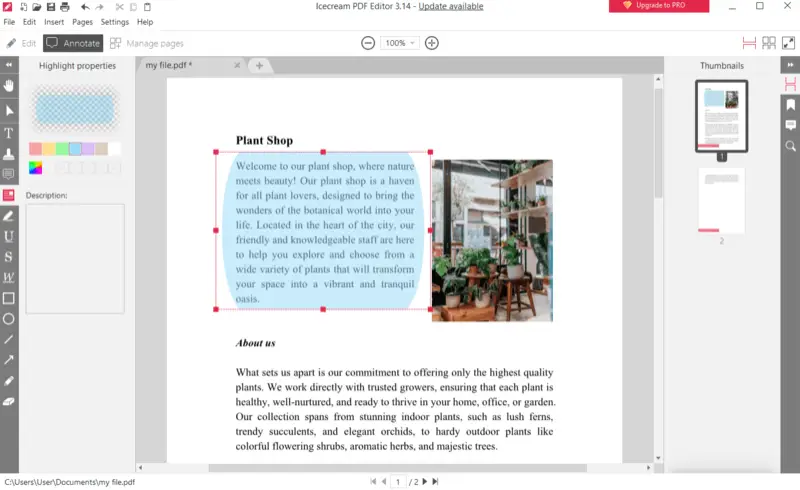
8. Underline
Add an underscore line to your text in PDF. The line colors available are the same as those in the "Highlight text" tool.
9. Strikeout
Cross out irrelevant information and any other unnecessary content for further editing text in your PDF document.
10. Wavy Underline
Point out some of the text by adding a curly line under it. This helps point out punctuation or grammar errors.
11. Rectangle
Draw a rectangle shape to indicate an important area of a document. This object has a frame and a color fill, the shades of which can be changed. Also, you can adjust the thickness of the outline and the transparency of the background. Hold Ctrl to draw a square.
12. Circle
Similar to the previous tool, select an area within the document and draw a circular shape. The settings of the fill and outline color, as well as the thickness of the latter and the transparency of the background are also customizable. Hold Ctrl to draw a perfect circle.
13. Line
This tool of the PDF annotator is used to mark non-text content or to draw a straight line. The color, boldness, and opacity can be regulated.
14. Arrow
Use the arrow to point to a specific part of the document or specify the sequence of actions in instructions. You can customize the color and thickness, too.
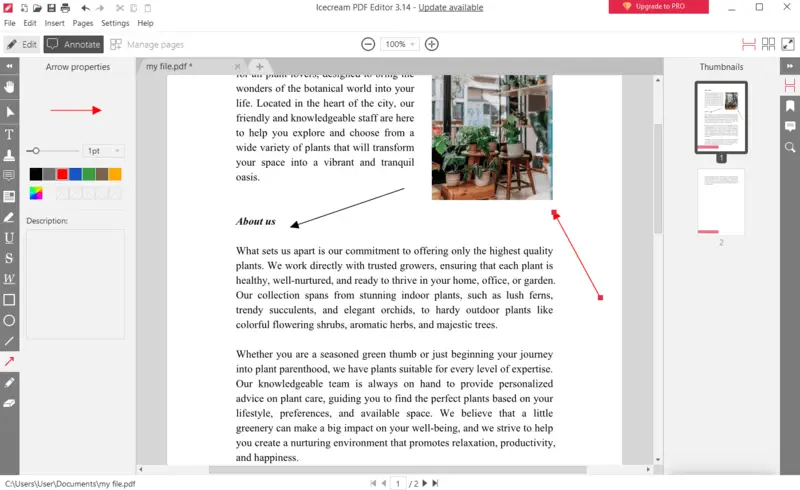
15. Pencil
Draw on the PDF with the mouse cursor. Use it to edit small flaws in pictures, and tables, as well as to create your illustration, add a signature, and write some text.
16. Eraser
This tool is created to fix elements that you drew with "Pencil". In its settings. you can change the size of the active area for more accurate and high-quality work with smaller objects.
How to annotate a PDF on Mac
Preview, the default PDF editor and viewer on Mac devices, offers a range of useful features for annotating PDFs. Whether you need to highlight important passages, add notes or comments, or even fill in a PDF form, this app has got you covered.
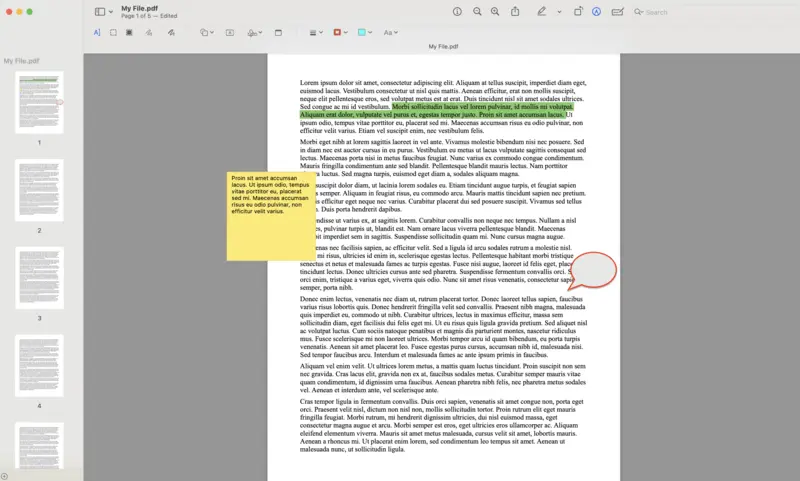
Let's go through all the various features Preview has to offer for annotating your PDFs.
1. Highlight Text
The most basic form of annotation is highlighting text. You can also alter the highlight color by selecting the color palette icon next to the "Highlight" option.
2. Strike-Through Text
This tool allows users to draw a horizontal line through selected text in a PDF document. Users can easily strike through words, phrases, or entire sentences to show changes or revisions made to the document.
3. Underline Text
Underline text in PDF by adding a straight line underneath selected text. Underlining can help draw attention to key points, making it easier for readers to identify critical details or concepts.
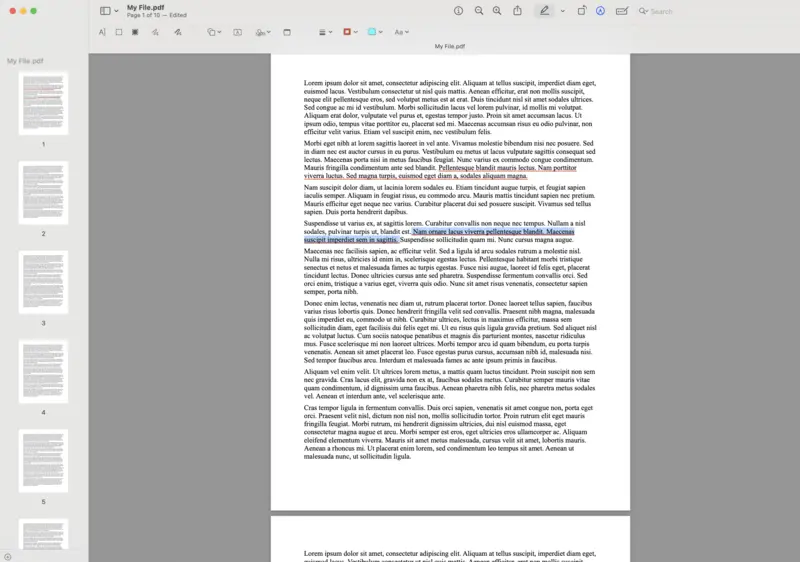
4. Add Notes
Sometimes, just highlighting text is not enough. You may consider including additional comments or notes for further clarification. Click the "Add Note" button in the toolbar to create a small pop-up box where you can type in your note.
5. Shapes and Lines
To emphasize a particular area of your PDF, you can utilize various drawing tools such as shapes and lines. You can draw a rectangular (square), oval (circle), line, arrow, polygon, or star.
6. Text Boxes and Speech Bubbles
Another way to add annotations is by using text boxes or bubbles. These are helpful if you wish to include lengthier remarks or clarifications. You can customize the font and size of your text using the formatting options in the toolbar.
7. Sketch
This tool allows users to freehand draw or sketch directly onto the PDF document. It's useful for adding diagrams, illustrations, or annotations more creatively.
8. Draw
Similar to "Sketch", the "Draw" tool enables users to draw anything by hand. It offers more control over the annotations, making it suitable for technical drawings or diagrams.
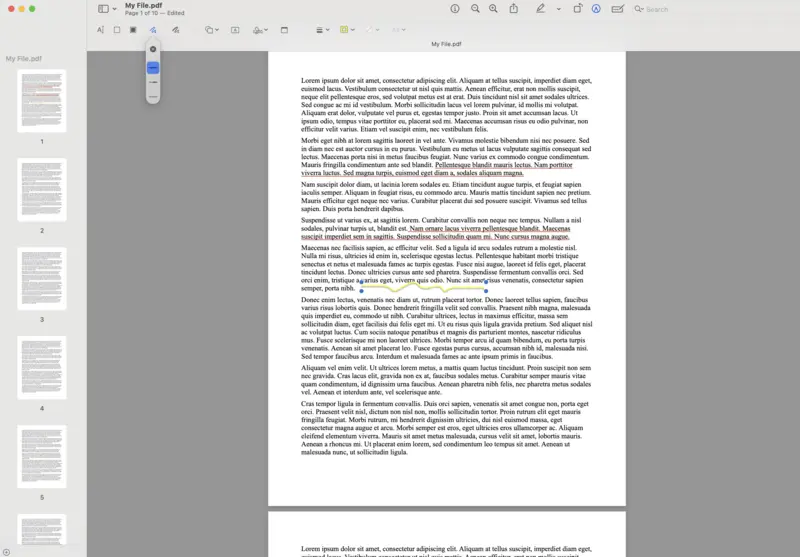
9. Rectangular Selection
This tool allows users to select a rectangular area of the PDF document to crop it out and delete; copy and paste to another part of the document; and more.
10. Redact
The "Redact" tool enables users to permanently remove sensitive or confidential information from the PDF document. It covers the selected area with a black box, ensuring that the redacted content cannot be viewed or recovered.
How to mark up a PDF on iOS
The Files app on iOS offers a convenient way to annotate PDFs directly on your device, making it easier to review and edit documents on the go.
With the ability to save and share your annotated files, it’s a powerful and portable solution for anyone who needs to work with PDFs on their iPhone or iPad.
Simply open the PDF within the app, tap the Markup icon (a pencil inside a circle) at the corner of the screen, and a toolbar will appear.
Pencil
The pencil allows for light, precise, and smooth freehand drawing on PDF, ideal for sketching or making fine details. It simulates the feel of a traditional pencil, with a soft, subtle line.
Ball Pen
This tool provides a thicker, darker line for bold strokes. It’s great for writing or marking up text in a more permanent and noticeable way than the pencil.
Highlighter
The highlighter creates a semi-transparent, bright-colored overlay, perfect for emphasizing important sections of text. It mimics the look of a traditional highlighter pen.

Eraser
The eraser allows you to remove any changes you’ve made. It can be adjusted to erase a small section or larger areas, giving you control over your edits.
Lasso
The lasso lets you select and move or delete specific parts of your annotation. You draw around the area you want to edit, making it easy to reposition or remove markings.
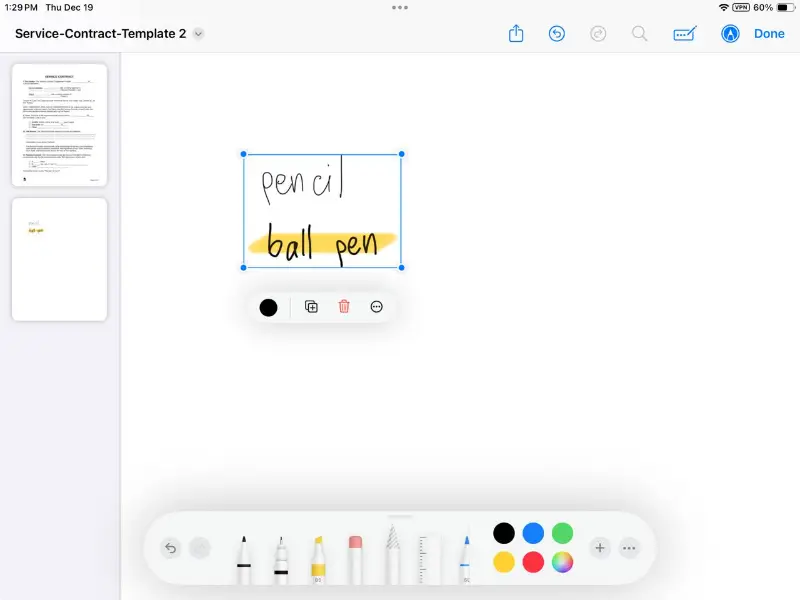
Ruler
This tool provides a straight edge for drawing precise lines. It can be adjusted to any angle, making it useful for straight lines, measuring, or aligning shapes.
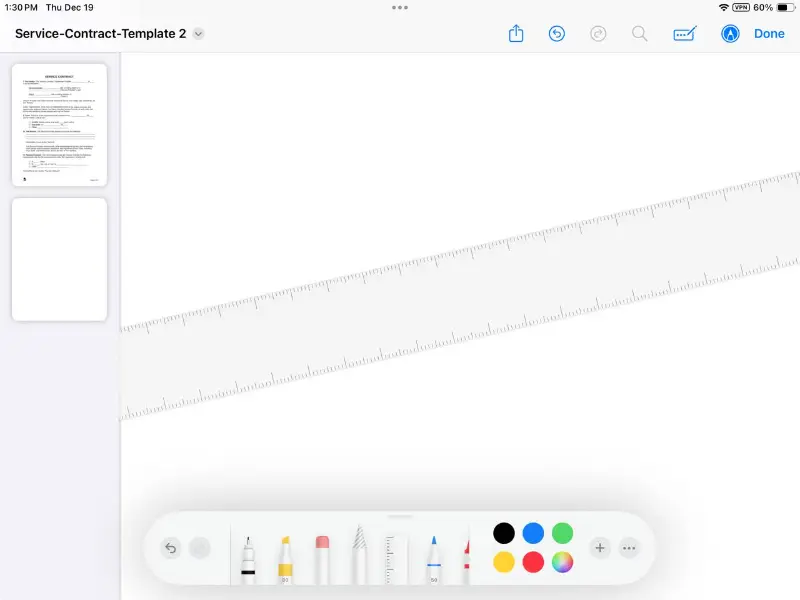
Marker
The marker gives a thicker, more pronounced line than the ball pen, with a more textured effect. It’s ideal for making bold, expressive marks on the document.
Crayon
This tool mimics the texture of a crayon, giving your drawings or highlights a slightly rough, waxy appearance. It’s useful for adding a more creative, textured element to your annotations on PDF.
Quill
The quill offers an elegant, thin line that gives the look of a fountain pen. It’s perfect for adding delicate, fine details or writing to your page.
Brush
This tool simulates the effect of using a paintbrush, adding a more fluid and expressive quality to your marks.
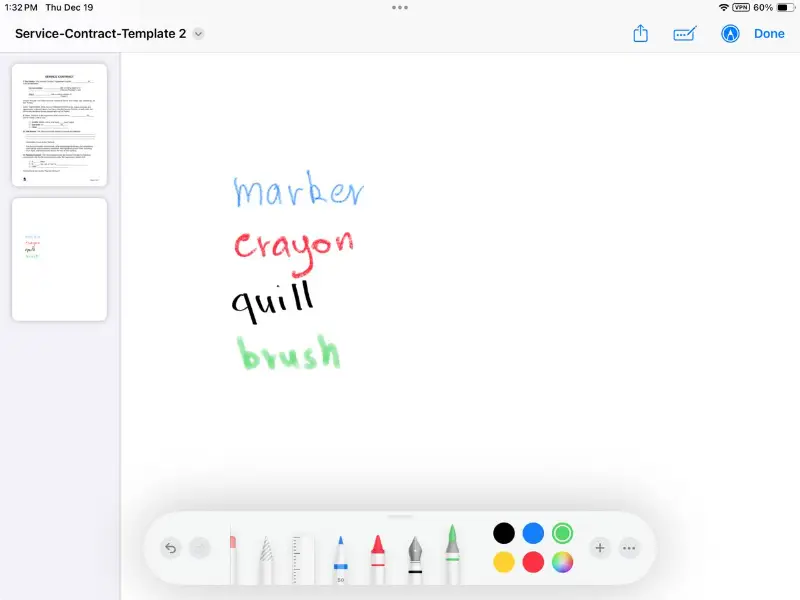
Add Element
You can place stickers, text, signatures, or shapes (such as rectangles, circles, and arrows) on your PDF. It’s versatile for enhancing your document with custom elements.
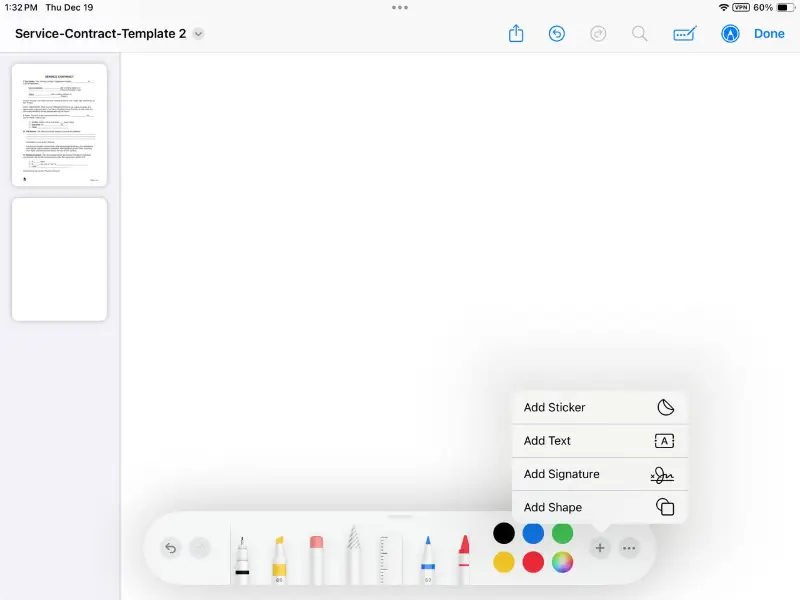
How to annotate PDF online
PDF Candy provides an easy way to annotate PDF documents online directly in your browser, making editing and reviewing more accessible and efficient.
With features that allow you to save and share annotated files, it’s a practical solution for users who need to modify PDFs without installing software.
Text Tool
This allows you to insert notes, comments, or explanations directly onto the page. You can adjust font size and color to match your preference.
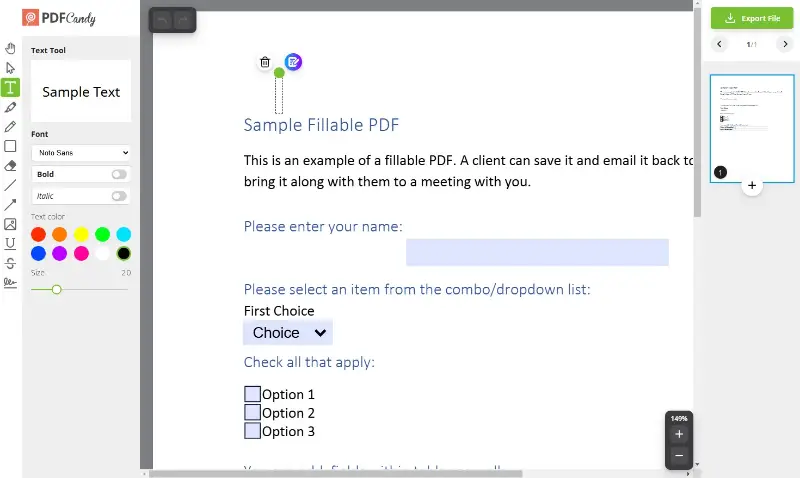
Highlighter
The highlight PDF text tool creates a translucent overlay in vibrant colors, ideal for emphasizing key sections of text without obscuring readability.
Pencil
This feature offers freehand drawing, enabling you to sketch, underline, or circle important content. It’s useful for quick, informal markups.
Arrow
It helps draw attention to specific points by adding clear directional indicators. You can customize arrow thickness and color.

Whiteout
The whiteout feature allows you to erase sections of text or images by covering them with a blank space, effectively removing unwanted content.
How to annotate PDF in Chrome
Web Highlights is a handy extension that lets you annotate and organize text directly on PDFs and web pages without leaving your browser. It’s perfect for students, researchers, and professionals who want to keep all their notes in one place.
Notes
Attach brief insights, clarifications, or reflections to selected content. Style them to suit your workflow and maintain clarity throughout your reading.
Highlight Overlay
Apply bold visual accents to specific lines or phrases using a palette of distinct tones. Emphasize key material without disrupting the page’s structure.
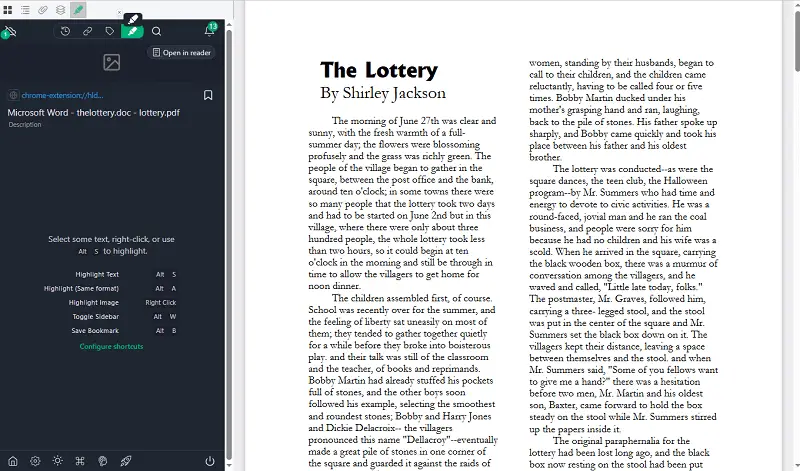
Smart Tags
Assign intuitive keywords to your selections, enabling quick filtering and effortless navigation through your saved material.
Seamless Export
Send your highlights and comments to external tools like Notion or Obsidian. Keep everything accessible and up to date across browsers and devices.
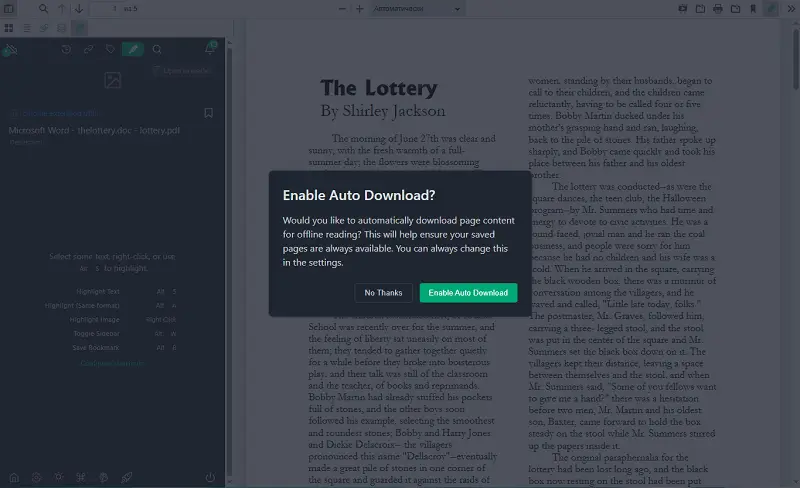
Who might need to learn to annotate PDF
- Designers. Experts in this field will appreciate the technical capabilities of a free PDF editor as they may need to work with this type of document to create a sketch of a preliminary design. In addition, web studio designers may need to draw on PDF such elements as logos, and tables, and leave notes for clients.
- Accountants and economists. A PDF editor is helpful for recognizing text in tables. So, if you encounter any errors while checking your report, you can correct them right away without creating a new document.
- Managers. Such a program will be useful to supervisors for drafting job descriptions, and employment contracts, and making corrections to documents on major transactions.
- Students and teachers. A PDF editor will be useful software for university students and educators. It will help create projects, grade papers, prepare practice reports, etc.
- Editors, copywriters, and content managers. Customers often provide information about their products in the form of a PDF file. To extract images from PDF, specifications, and company labels you need powerful software to edit PDF files.
- Lawyers. Those in the legal field frequently examine complex agreements, litigation materials, or supporting evidence. An advanced PDF solution helps mark important sections, add context, and draft changes.
- Other PDF editing professionals. The discussed programs have a large set of PDF editing tools and a clear interface. It is suitable for both novice users and professionals with great experience.
PDF annotation tips
DO:
- Use different colors for different types of annotations (e.g. red for corrections, blue for comments).
- Take advantage of the sticky note feature to add reminders or questions for further discussion.
- Utilize the PDF drawing tools to create diagrams or illustrations for better understanding.
- Consider using a separate color code key for easy reference and organization of annotations.
- Utilize the search function to quickly find specific words in PDF or phrases within the document.
- Make a backup of the old file so you can always refer back to your original document if needed.
Conclusion
In conclusion, annotating a PDF can be a useful skill to have, whether for work, school, or personal use. Equipped with either of the mentioned PDF annotators, you can easily annotate and edit PDFs and make them more organized and meaningful.
Enhance your reading experience and make studying or working with digital documents more efficient and effective!
FAQ
- Will PDF annotations be visible when I convert a document to another format?
- Annotations may not be preserved depending on the PDF converters and the format you are converting to. It's a good idea to check the converted document to ensure all marks have been retained.
- Are there any file size considerations when annotating PDFs?
- Marks can slightly increase PDFs size, depending on the annotations type and their number. However, this increase is usually minimal compared to the overall size of the document.



